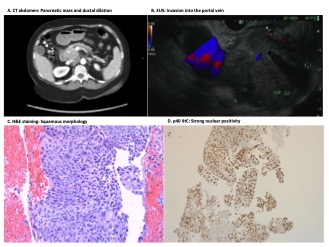Sunday Poster Session
Category: Biliary/Pancreas
P0103 - Primary Squamous Cell Carcinoma of the Pancreas Presenting With Obstructive Jaundice: A Rare Case Report
Sunday, October 26, 2025
3:30 PM - 7:00 PM PDT
Location: Exhibit Hall

Romelia A. Barba, MD (she/her/hers)
Texas Tech University Health Sciences Center
Lubbock, TX
Presenting Author(s)
Romelia A. Barba Bernal, MD1, Zeyad Elharabi, MBBS, MS1, Khawaja Hassam, MD2, Haley Lewsey, MS1, Saiyeeda Tahrima, MBBS3, Gloria Erazo, MD4, Hakan Akin, MD1, Asad Ullah, MD1, Kanak Das, MD5
1Texas Tech University Health Sciences Center, Lubbock, TX; 2Lahey Hospital and Medical Center, Woburn, MA; 3Rajshahi Medical College Hospital, Rajshahi, Rajshahi, Bangladesh; 4Texas Tech University Health Sciences Center, Odessa, TX; 5Texas Tech University, Lubbock, TX
Introduction: Primary squamous cell carcinoma (SCC) of the pancreas is an extremely rare malignancy, accounting for less than 1% of all pancreatic cancers. The pancreas lacks native squamous epithelium, and diagnosis requires exclusion of metastatic disease. Due to its aggressive nature and limited therapeutic options, pancreatic SCC has a poor prognosis. This case highlights diagnostic and management considerations for this rare entity.
Case Description/
Methods: A 62-year-old woman with a history of alcohol use presented with progressive jaundice, dark urine, and pruritus. Laboratory evaluation showed a total bilirubin of 8.5 mg/dL and elevated ALP and GGT. Imaging revealed a pancreatic head mass with biliary obstruction. ERCP showed a distal common bile duct stricture, requiring stent placement. MRCP and MRI confirmed a mass in the pancreatic head with peripancreatic lymphadenopathy and possible vascular invasion. Endoscopic ultrasound revealed a heterogeneous hypoechoic mass in the head of the pancreas measuring 4 cm with features suggestive of malignancy. Fine needle aspiration biopsies reveal infiltrating sheets of polygonal cells with intercellular bridges, eosinophilic cytoplasm, pleomorphic nuclei with prominent nucleoli, keratinization, and increased mitotic activity. Immunohistochemistry was positive for CK5/6 and p40, and negative for neuroendocrine and GI markers, confirming a diagnosis of primary pancreatic SCC, and SCC of other sites was clinically and radiologically ruled out. Extensive imaging and endoscopic evaluation ruled out other primary sites. Due to vascular invasion and nodal involvement, the disease was deemed unresectable. The patient declined chemotherapy and opted for palliative care. She underwent successful biliary decompression and celiac plexus block for pain control and was transitioned to hospice.
Discussion: Primary SCC of the pancreas is a diagnosis of exclusion, requiring comprehensive imaging and histopathological confirmation. The pathogenesis remains unclear but may involve squamous metaplasia or progenitor cell transformation. Prognosis is poor, especially in unresectable cases. Surgical resection offers the best chance at survival, but most patients present with advanced disease. This case illustrates the need for early recognition, the role of EUS-FNA in diagnosis, and the importance of aligning treatment with patient goals in rare pancreatic malignancies.

Figure: Figure 1. Multimodal Evaluation of Primary Squamous Cell Carcinoma of the Pancreas.
(a) Contrast-enhanced CT abdomen showing a hypodense mass in the head of the pancreas with associated pancreatic ductal dilation.
(b) Endoscopic ultrasound (EUS) with Doppler demonstrating a hypoechoic pancreatic head mass with evidence of invasion into the portal vein.
(c) Hematoxylin and eosin (H&E) staining of the EUS-guided fine-needle aspiration biopsy reveals sheets of polygonal squamous cells with eosinophilic cytoplasm, intercellular bridges, and keratinization.
(d) Immunohistochemistry positive for p40, confirming squamous differentiation.
Disclosures:
Romelia Barba Bernal indicated no relevant financial relationships.
Zeyad Elharabi indicated no relevant financial relationships.
Khawaja Hassam indicated no relevant financial relationships.
Haley Lewsey indicated no relevant financial relationships.
Saiyeeda Tahrima indicated no relevant financial relationships.
Gloria Erazo indicated no relevant financial relationships.
Hakan Akin indicated no relevant financial relationships.
Asad Ullah indicated no relevant financial relationships.
Kanak Das indicated no relevant financial relationships.
Romelia A. Barba Bernal, MD1, Zeyad Elharabi, MBBS, MS1, Khawaja Hassam, MD2, Haley Lewsey, MS1, Saiyeeda Tahrima, MBBS3, Gloria Erazo, MD4, Hakan Akin, MD1, Asad Ullah, MD1, Kanak Das, MD5. P0103 - Primary Squamous Cell Carcinoma of the Pancreas Presenting With Obstructive Jaundice: A Rare Case Report, ACG 2025 Annual Scientific Meeting Abstracts. Phoenix, AZ: American College of Gastroenterology.
1Texas Tech University Health Sciences Center, Lubbock, TX; 2Lahey Hospital and Medical Center, Woburn, MA; 3Rajshahi Medical College Hospital, Rajshahi, Rajshahi, Bangladesh; 4Texas Tech University Health Sciences Center, Odessa, TX; 5Texas Tech University, Lubbock, TX
Introduction: Primary squamous cell carcinoma (SCC) of the pancreas is an extremely rare malignancy, accounting for less than 1% of all pancreatic cancers. The pancreas lacks native squamous epithelium, and diagnosis requires exclusion of metastatic disease. Due to its aggressive nature and limited therapeutic options, pancreatic SCC has a poor prognosis. This case highlights diagnostic and management considerations for this rare entity.
Case Description/
Methods: A 62-year-old woman with a history of alcohol use presented with progressive jaundice, dark urine, and pruritus. Laboratory evaluation showed a total bilirubin of 8.5 mg/dL and elevated ALP and GGT. Imaging revealed a pancreatic head mass with biliary obstruction. ERCP showed a distal common bile duct stricture, requiring stent placement. MRCP and MRI confirmed a mass in the pancreatic head with peripancreatic lymphadenopathy and possible vascular invasion. Endoscopic ultrasound revealed a heterogeneous hypoechoic mass in the head of the pancreas measuring 4 cm with features suggestive of malignancy. Fine needle aspiration biopsies reveal infiltrating sheets of polygonal cells with intercellular bridges, eosinophilic cytoplasm, pleomorphic nuclei with prominent nucleoli, keratinization, and increased mitotic activity. Immunohistochemistry was positive for CK5/6 and p40, and negative for neuroendocrine and GI markers, confirming a diagnosis of primary pancreatic SCC, and SCC of other sites was clinically and radiologically ruled out. Extensive imaging and endoscopic evaluation ruled out other primary sites. Due to vascular invasion and nodal involvement, the disease was deemed unresectable. The patient declined chemotherapy and opted for palliative care. She underwent successful biliary decompression and celiac plexus block for pain control and was transitioned to hospice.
Discussion: Primary SCC of the pancreas is a diagnosis of exclusion, requiring comprehensive imaging and histopathological confirmation. The pathogenesis remains unclear but may involve squamous metaplasia or progenitor cell transformation. Prognosis is poor, especially in unresectable cases. Surgical resection offers the best chance at survival, but most patients present with advanced disease. This case illustrates the need for early recognition, the role of EUS-FNA in diagnosis, and the importance of aligning treatment with patient goals in rare pancreatic malignancies.

Figure: Figure 1. Multimodal Evaluation of Primary Squamous Cell Carcinoma of the Pancreas.
(a) Contrast-enhanced CT abdomen showing a hypodense mass in the head of the pancreas with associated pancreatic ductal dilation.
(b) Endoscopic ultrasound (EUS) with Doppler demonstrating a hypoechoic pancreatic head mass with evidence of invasion into the portal vein.
(c) Hematoxylin and eosin (H&E) staining of the EUS-guided fine-needle aspiration biopsy reveals sheets of polygonal squamous cells with eosinophilic cytoplasm, intercellular bridges, and keratinization.
(d) Immunohistochemistry positive for p40, confirming squamous differentiation.
Disclosures:
Romelia Barba Bernal indicated no relevant financial relationships.
Zeyad Elharabi indicated no relevant financial relationships.
Khawaja Hassam indicated no relevant financial relationships.
Haley Lewsey indicated no relevant financial relationships.
Saiyeeda Tahrima indicated no relevant financial relationships.
Gloria Erazo indicated no relevant financial relationships.
Hakan Akin indicated no relevant financial relationships.
Asad Ullah indicated no relevant financial relationships.
Kanak Das indicated no relevant financial relationships.
Romelia A. Barba Bernal, MD1, Zeyad Elharabi, MBBS, MS1, Khawaja Hassam, MD2, Haley Lewsey, MS1, Saiyeeda Tahrima, MBBS3, Gloria Erazo, MD4, Hakan Akin, MD1, Asad Ullah, MD1, Kanak Das, MD5. P0103 - Primary Squamous Cell Carcinoma of the Pancreas Presenting With Obstructive Jaundice: A Rare Case Report, ACG 2025 Annual Scientific Meeting Abstracts. Phoenix, AZ: American College of Gastroenterology.

